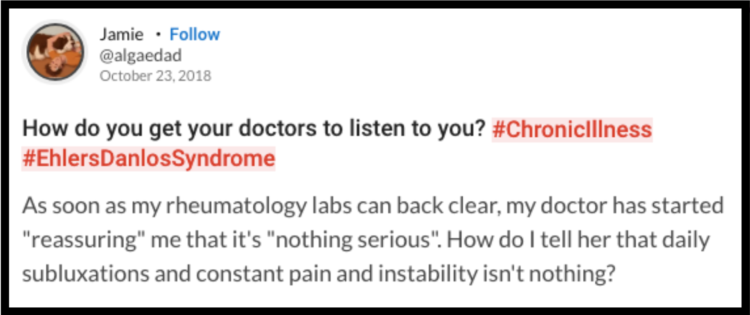11 'Red Flags' That Might Mean It's Time to Find a New Doctor for Your Ehlers-Danlos Syndrome
Finding a good doctor is really important when you have Ehlers-Danlos syndrome – especially since there is no cure and little research on EDS. Unfortunately, before you find your superstar doctor, you will probably have to deal with some not-so-hot docs. I have lost count of how many doctors I have seen through my seven- year chronic illness journey. Sometimes these doctors may admit to not knowing how to help you, say the wrong thing or even be blatantly rude – these are what we call “red flags,” or warnings.
• What is Ehlers-Danlos Syndrome?
• What Are Common Ehlers-Danlos Syndrome Symptoms?
Mighty contributor Kelly Douglas recalls a time she left the doctor’s office “haunted by the lingering effects of the practitioner’s unintentionally ableist phrasing.” No doctor should ever make you feel this way.
These red flags can sometimes be hard to see, so we asked our Mighty community to share some red flags that would indicate it is time to find a new doctor to treat your EDS.
Finding a new doctor can sometimes be tricky due to location, finances or insurance. But know you deserve to feel confident in your doctor’s care, and they should never, ever make you question yourself or your diagnosis.
Here is what our community shared with us:
1. If the doctor blames your symptoms on weight without thoroughly investigating.
“[A red flag would be a doctor saying,] ‘I don’t know what that is (EDS) and I don’t have time to research it as I have many other patients I have to deal with. But let’s get you in to see the other doctor and she can get you on a plan to lose weight, that should help you a lot.’” – Jada T.
“If the first and/or only thing they want to talk about is my weight.” – Kaylla S.
2. If the doctor isn’t knowledgeable about EDS, and won’t educate themselves on the condition.
“If a doctor can’t even get good information on EDS that I could find with a basic google search, it’s time for a new doctor.” – Hosanna R.
“If a doctor knows as much as the general public about my disease (pretty much nothing) then I will change doctors immediately. I don’t have the time to be educating someone who should already know about this.” – Katie W.
“I had a doctor say that I knew more about my disease than he did and that it was a waste for him to do any research.” – Unity M.
3. If the doctor makes you question yourself and/or your diagnosis.
“When you dread going to the doctor because they make you doubt yourself; you question whether or not your symptoms are real or as severe as you say.” – Kathryn M.
Want to connect with other EDS “zebras” in a judgment-free space? Download our free Mighty app to more easily give and receive support.
4. If the doctor says there’s no point in diagnosing EDS.
“[A red flag would be a doctor saying] ‘You don’t need an actual diagnosis, there isn’t anything we can do other than treat the symptoms anyway.’” – Trish D.
“According to one of my doctors, if there’s no cure then you should probably just accept your life. I understand doctors that want to treat the problem instead of the symptoms, but sometimes all you can do is manage symptoms, and your doctor should be taking an active interest in helping you find solutions that work for your symptoms and the lifestyle you want to achieve.” – Danielle T.
5. If the doctor says you can’t be sick because you “look too healthy.”
“When your doctor says that nothing’s wrong with you because you’re a ‘young white female.’” –Aimee N.
“A chiropractor once told me, ‘You’re a young and healthy woman. If you don’t think about your pain, you’ll start to feel better.’”- Lexi M.
6. If the doctor doesn’t see you as an individual.
“Cookie cutter treatment, where they keep saying the treatment or drug worked for others, even though it isn’t working for you.” – Karly B.
7. If the doctor says EDS just means you’re flexible, and doesn’t cause pain.
“When a doctor says EDS is ‘just’ hypermobility.” – Brooke N.
“Any doctor who tells you EDS doesn’t cause pain, or tries to ‘cure’ your pain with muscle relaxers.” –Dot T.
If getting doctors to listen to you is difficult, join the conversation below:
8. If the doctor believes your symptoms are psychosomatic.
“When your doctor (who is not a psychiatrist) tells you that your symptoms are caused by anxiety, and then suggests that you take an SSRI when that assumption makes you cry. When a doctor thinks you’re too focused on your pain and exaggerating because you look like you’re in pain, and then when you’re clearly having a good day they act like that’s a sign that you were lying the whole time.” – Chloé W.
9. If the doctor ignores your warnings and concerns.
“It is a clear red flag if you have all your risk factors listed and the doctor ignores the list, doing all the procedures in a way one should not do [them] with a patient who has EDS.” – Soja M.
“Me: ‘The rheumatologist you sent me to says I have EDS, so no “high-velocity neck maneuvers” anymore. The World Health Organization says they shouldn’t be done with EDS patients.’
Chiropractor: ‘Nonsense, I’ve been doing this for 25 years; I know what I’m doing.’” – Kate E.
10. If the doctor doubts your EDS diagnosis without thoroughly investigating.
“Any doctor that immediately questions my Ehlers-Danlos diagnosis, or the doctor/type of doctor that did the diagnosis. Also, often it is said, ‘the pain is in your head’ or ‘well you look great, you’re only 29.’ Age doesn’t play a factor in causing genetic illness!’ – Breezy N.
“When the orthopedist told me that he doubted I had EDS because my calves were tight. Even though it was confirmed by a geneticist at the Mayo Clinic.” – Stephanie M.
11. If the doctor makes you feel inferior.
“When they can’t be a team player and realize that you are part of the team as well. Each doctor has to be willing to work with each other and know their limits as well as learn along the way…” – Sarah E.
“They treat me like a know-it-all because I advocate for myself and my health.” – Kerrie W.
“One important rule to live by is that you should feel safe and like an equal in a doctor’s appointment. If you can’t trust them for that, you’re never going to have the rapport you need to get the best quality treatment.” – Leah R.
If you have experienced any of these red flags, then it may be time to switch doctors. It may seem scary starting all over with someone new, but your health is worth it.


